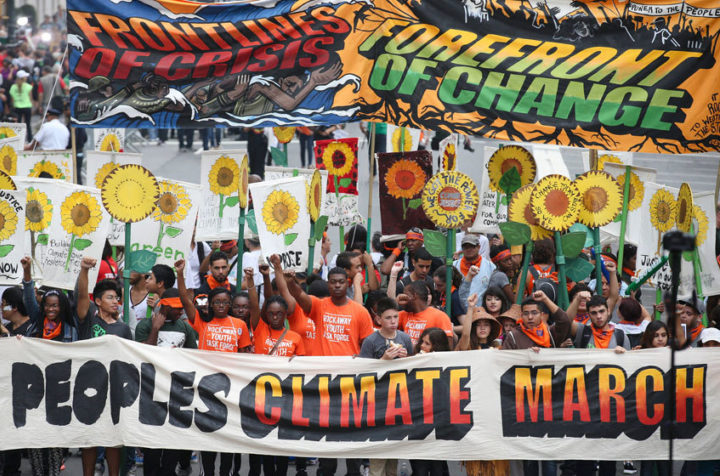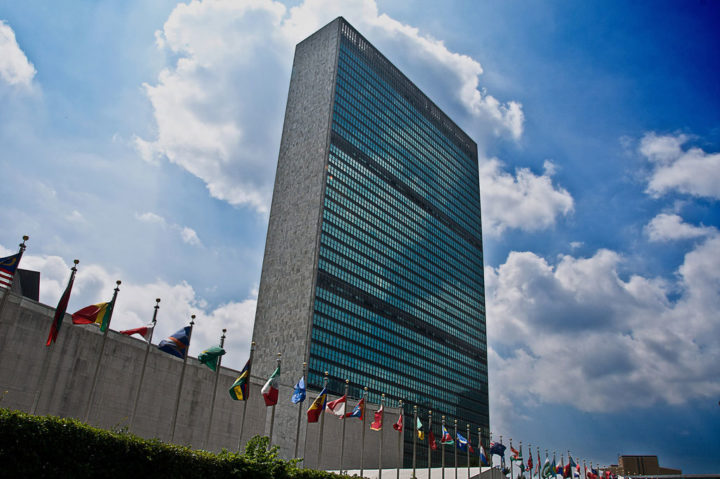New York fires the starting gun on rich reporting
Climate change: not just for environment journalists anymore
By George Smeeton
Share
Last updated:
Richard Black, ECIU Director
For environment journalists, Tuesday’s UN climate summit represents both an opportunity and a threat.
An opportunity, because having 125 heads of state and government turn up to UN headquarters to discuss climate change – not to mention business leaders by the score and 400,000 people on the streets – indicates that the story is going to be more alive for the next 15 months than it has been for years.

A threat, because the story isn’t all yours anymore.
Just as Tony Blair’s prioritisation of climate change for the UK G8 Presidency in 2005 alerted Westminster correspondents that a good story was cooking on their patch, this year the meaty bits are largely in the bailiwick of economics and business specialists.
The Rockefellers, heirs to Standard Oil, pull their money out of fossil fuels. A thousand companies, many of which already put a price on carbon internally, call for a global pricing mechanism. Google, Facebook, Microsoft and Yell sever ties with a lobby group that campaigns against low-carbon policies. Ratings agency Standard and Poor’s downgrades US coal stocks.
This, now, is where the main story lies.
Catching fire
Some media titles caught on a long time ago, and the Financial Times’ business and economics pages are now required reading for anyone wanting the most important news and analysis on climate and energy. The Economist and the Telegraph are not far too behind.
Editors in other organisations, the BBC among them, have not caught on. The recent news that wind and solar are now cost-competitive with gas in the US merited only a dismissive 30-second mention on the early morning Radio Four business slot, even though the news came from blue-chip Lazard. TV editors chose to base coverage of the New York events on shrinking glaciers rather than shrinking coal stocks.

It’s entirely right that science and environment specialists should retain a major role in coverage, because climate change is the main reason why spending in the energy sector is changing so rapidly.
But they won’t have it all their own way; and neither should they.
For the reader, listener and viewer, having a diversity of specialists engaged in the subject comes with pluses and minuses.
During my time at the BBC, I was always grateful when a business reporter wanted to cover carbon pricing stories because their understanding of economics was greater than mine. But conversely I cursed when they mangled a piece of science or policy.
Covering David Cameron’s speech on Tuesday (and the tweets that surrounded it), a politically attuned reporter would be best placed to spot that when he said the UK would end coal–fired electricity generation by 2030, that is an expectation based on current policy – it’s not an actual ban.
But it would take someone who follows the science to spot the obviously missing caveats in Mr Cameron’s description of shale gas as ‘lower-carbon energy’.
And hearing Ed Miliband promise to create a ‘million green jobs’ on Tuesday, only a hoary old hack would recall that according to the last Labour government, the UK already had 900,000 green jobs in 2010.
Diversity appeals
Used well, a diverse set of reporting skills produces better coverage. Used badly, it’s just a war to get on the front page – which the big beasts of Westminster and the City are usually going to win.
Green jobs, divestment, grid parity, levelised costs, capacity payments, CapEx spend… statistoids on them all are going to be flung around like confetti over the next 15 months in the run-up to the UN climate convention summit in Paris, whether or not governments eventually come through on their pledge to conclude a new global agreement.
Long before that – in just a month’s time, in fact – European governments are due to sign off a new package of energy and climate measures to run until 2030.
Its effectiveness will hinge on such exciting-sounding terms as the effort sharing decision, the solidarity mechanism, the PRIMES baseline… and reporting well on what the package actually means does entail getting to grips with these concepts, as they’re much more than footnotes. They determine whether the headline figures can be met.
So, climate reporting currently needs all the specialists it can get. New York fired the starting gun on what’s likely to be a busy, diverse, spin-laden, colourful, rich and exciting 15 months ahead.
Share